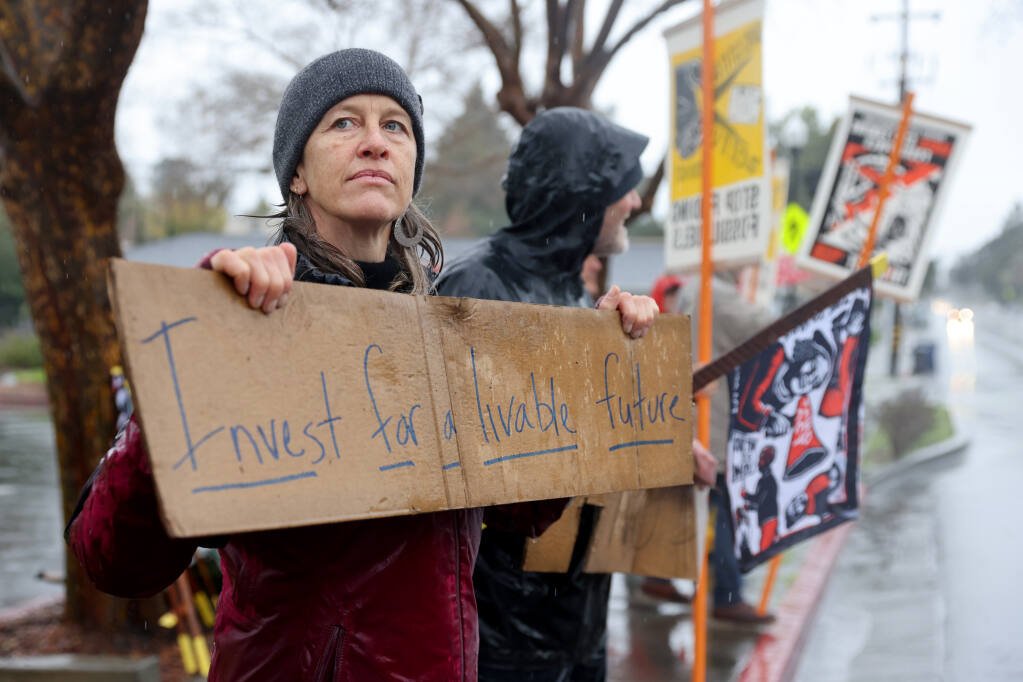Over the weekend, the Guardian published a piece by Pakistani author and columnist Fatima Bhutto — “There’s no greater feminist cause than the climate fight – and saving each other” — that is a must read for all. She makes the case, urgently, passionately and emphatically, that climate justice is the number one feminist issue right now for all of us.
You may be thinking, what about abortion rights, or gender equity issues like the lack of women leaders in governments and business, or the economic, educational and healthcare disparities that affect so many women across the world? Of course, all of those inequities are important and worth fighting for, but the climate crisis demands our attention now.
Why? The climate emergency and its consequences affect women more than men. It's already happening everywhere in the world. Extreme weather events like floods, droughts, superstorms, and heat waves affect the most vulnerable, and often that means women and children. The UN estimates that women and girls account for 80% of the people displaced by climate change impacts. Women often are the ones tasked with gathering and producing food, collecting water and sourcing fuel for heating and cooking. With climate change, these tasks are becoming more difficult and time-consuming.
The Time to Act Is Now
Many of you likely read about the new Synthesis Report released last week that summarizes the findings of the IPCC’s Sixth Assessment Report. The Intergovernmental Panel on Climate Change (IPCC) is the United Nations body for assessing the science related to climate change. It is made up of the world's top climate scientists and issues reports every six years. The bottom line of this year's report is to “act now, or it’s too late,” the Guardian wrote.
Major themes of the report were action, speed and justice. This is the defining decade for solutions for climate justice. We have less than 7 years to hit the necessary targets for a habitable planet, and the good news is that we already have all the solutions we need to achieve the goal of the Paris Agreement — keeping temperature rise under 1.5°C. (Why that's important.)
As Covering Climate Now noted in its Climate Beat newsletter: "What’s lacking, the report makes clear, are not viable and economically attractive solutions to the climate emergency but political and economic leaders who will implement those solutions." We’re on the cusp of a clean energy revolution and getting us there with just and equitable solutions is up to women.
Kristan Klingelhofer joins protesters organized by Third Act as they gather outside Bank of America in Sebastopol, Tuesday, March 21, 2023. (Beth Schlanker / The Press Democrat)
Women Are the Key to Solving the Climate Crisis
We must unite, collaborate, and declare climate justice as a priority for individuals, families, communities, companies and countries.
A report from last year's UN Bonn Climate Change Conference highlighted how women are and can be powerful agents of change. "When they have equal access to decision-making opportunities," it notes, "they make more sustainable decisions for example, improved school attendance rates for their children, increased food security, greener mobility patterns and reduced energy demand."
Representing more than 2,000 Swiss women aged 64 and older, Senior Women for Climate Protection decided unanimously to bring the case to the highest court in the country after it was rejected by a lower one. (Greenpeace)
Women everywhere are already taking action. Earlier this week, a group of women in Switzerland sued their government in a landmark legal case before the European Court of Human Rights claiming that government inaction on climate change is violating their human rights. They want the ECHR to order the Swiss government to work harder and faster at reducing greenhouse gas emissions. The women, who call themselves the Club of Climate Seniors, have an average age of 73. Heat waves, which are increasing in frequency due to climate change, are particularly dangerous for elderly people. If the women win their case, the BBC reports, it “could set a precedent for every one of the European court's 46 member states.”
As Mary Robinson, the former president of Ireland, former UN High Commissioner for Human Rights and Connected Women Leaders member said in London at our Women of the World Climate Conversation panel earlier this month:
“Women leaders have to step up now because we are in a very severe crisis. Who are these women leaders? It's all of you.”
“Climate is now the priority of every woman leader for the next seven years until 2030… There's an intersectionality between whether you work on health, whether you work on girls education, whether you work on violence against women, me too issues — they are all aggravated by climate shocks that we are suffering from.
We are on the cusp of a very exciting clean energy, healthier, fairer world. It's in our grasp, but we are heading for a world that will warm to 2.4 degrees C at best, but could be 3.0°C, which would be catastrophic.
It's a race. It's a crisis which requires women's action. We want each of you to make this personal in your lives. Talk about it. Talk about it in terms of the wonderful possibilities that are still ahead of us.”
As I mentioned in an earlier newsletter, the Connected Women Leaders cohort is developing a women-led climate campaign called Project Dandelion that we will be announcing very soon with very clear actions you can take.
I hope you will join me in making climate justice personal and centering it in your work, activism, and community. As Fatima writes in her piece, "Climate justice is not just a feminist issue, it is an existential one. It is quite literally the fight of our lives. And we are running dangerously out of time."
Onwards!
- Pat




